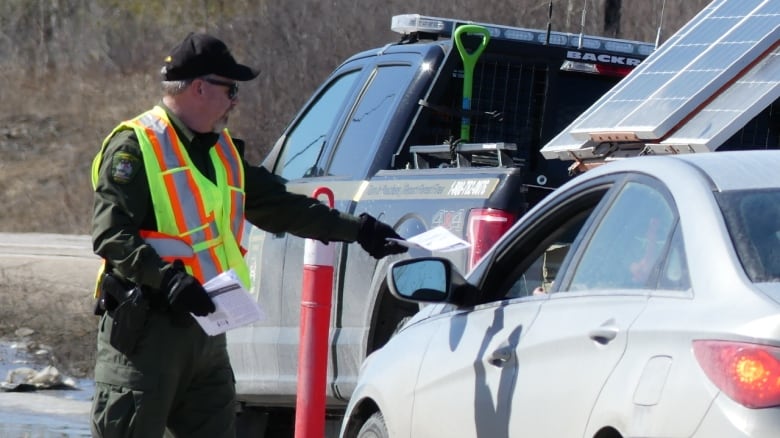Manitoba First Nations call on RCMP, Armed Forces to monitor COVID-19 checkstops
MKO also wants northern Liquor Marts to stop selling or limit sales volume of alcohol

The advocacy group for 26 First Nations communities in Manitoba's north is calling on the RCMP and Canadian Armed Forces to monitor checkstops set up to prevent visitors from possibly bringing COVID-19 into their communities.
Manitoba Keewatinowi Okimakanak also wants the province to help monitor checkstops on highways 6 and 10 as well as Provincial Road 483.
Several Manitoba First Nations have set up mandatory checkstops in recent weeks as part of an effort to protect their communities from COVID-19.
Two Manitoba First Nations also have asked Defence Minister Harjit Sajjan to establish a military hospital in their region in anticipation of an outbreak of COVID-19.
So far there has been one confirmed case of COVID-19 in Manitoba's Northern Health Region. The province hasn't said what community the case is in but Dr. Brent Roussin, Manitoba's chief public health officer, said Tuesday there were no positive patients in First Nations communities.
MKO also is asking Manitoba Hydro to close the Keeyask construction site over fears the hundreds of workers there could bring COVID-19 to nearby First Nations.
Hydro said it has already scaled back its workforce on the site and taken extra precautions, including suspending gym classes and switching the meal hall from a dining centre to a takeout only service.
Since March 21, the number of staff living and working at Keeyask has been reduced from 1,300 to approximately 700, Hydro spokesperson Bruce Owen said.
Anyone who is still on site who is sick will be seen by a nurse practitioner and then put into isolation off-site, he said.
Anyone arriving at the site without prior authorization is being turned away at the gate and if workers need to leave for emergencies, the situation will reviewed on a case-by-case basis, Owen said.

MKO also is calling for the closure of Manitoba Liquor Marts in the north. If closures aren't possible, the group is asking for a purchase limit to be put in place to reduce the sale of liquor by bootleggers in northern First Nations.
A Manitoba Liquor & Lotteries spokesperson said maximum daily bottle limits are already in place in a number of northern liquor retailers, including in Thompson and in Lynn Lake.
The Manitoba government has already set up checkpoints of its own at provincial borders. Staff at the checkpoints are telling drivers entering the province to self-isolate for 14 days with a few exceptions.
Premier Brian Pallister said Wednesday there is no plan to restrict travel internally in the province at this time.
Floriane Bonneville, Sajjan's press secretary, said in a statement Tuesday night the health and safety of Canadians and Indigenous communities is the government's top priority.
"We understand that Indigenous, northern and Arctic communities are especially vulnerable to COVID-19," the defence minister's spokesperson said.
"We are working closely with Indigenous Services, Public Safety Canada and other federal and provincial government departments to determine next steps."
RCMP Sgt. Paul Manaigre said officers will respond and assist First Nations safety officers or community members staffing checkstops to help maintain the peace or investigate any criminal offences that may occur at these locations.
"While our officers will be at the checkstops when and if needed, the RCMP will not be setting up, actively enforcing or monitoring the checkstops, as these actions do not fall under provincial or federal emergency measures legislation, and are not enforceable by the RCMP," he wrote in an email.

